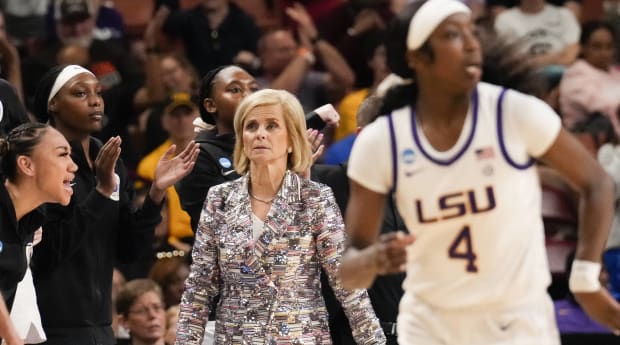As her squad made its way to the Final Four, signifying a new era for a program that needed one, LSU coach Kim Mulkey kept reiterating a message.
Don’t give me the credit for this.
“It’s not my great coaching that got us there,” Mulkey said before the Elite Eight. “Honestly, it’s the transfer portal. … We’ve got nine new pieces, including freshmen, that have helped us jump-start this program fast.”
When Mulkey arrived in Baton Rouge two years ago, the program was coming off a 9–13 season and had failed to qualify for the NCAA tournament for several years in a row. It also hadn’t reached the Sweet 16 since 2014 following six straight appearances between ’03 and ’08. The glory days of Seimone Augustus and Sylvia Fowles felt distant. Mulkey was joining LSU after winning three national championships at Baylor, and she expected that change would take some time, gradually adding talent and raising standards each year.
But with increased player movement in the transfer portal, along with a few key freshmen, LSU boasts a 32–2 record and is in the Final Four for the first time since 2008 with a shot at its first national title. Credit the infusion of talent. And players say—however much she may protest—to credit Mulkey, too.
“She brought us here,” said freshman guard Flau’jae Johnson. “She doesn’t give herself enough credit. She brought these pieces to Baton Rouge. She probably didn’t know how it was going to fit, but she knew that she had something. You feel me? We’re building a culture.”

Jim Dedmon/USA TODAY Sports
The Tigers are a shining example of just how much the NCAA’s new transfer rules can allow a program to quickly remake itself. The most eye-popping addition has been Maryland transfer Angel Reese, who has put together one of the best seasons in the country, averaging 23.2 points and 15.7 rebounds per game. She’s joined by fellow transfers LaDazhia Williams (Missouri), Jasmine Carson (West Virginia) and Kateri Poole (Ohio State), as well as freshmen Johnson, Sa’Myah Smith and Last-Tear Poa. The only returning starter from last season is Alexis Morris, who’s in her second year with the team after transferring from Texas A&M, with previous stints at Rutgers and Baylor, where she had been coached by Mulkey.
In short? That’s a lot of roster turnover for one season. But it’s just what Morris was hoping for when she signed on last year. She knew Mulkey would end up bringing in plenty of new players, and even without knowing who they would be or how their skill sets might fit (or not), Morris was ready to jump in.
“I didn’t doubt her,” Morris said. “I never wondered, either. I never was concerned about it, because I knew she was going to bring in pieces that fit well with me and fit well with her system.”
It’s not just that Morris is the only returning starter: She’s the only returning player who appeared in more than five games and averaged more than five minutes. That’s meant stepping into a leadership role both on and off the court. (“Sometimes being a leader is hard,” she said. “Having to be the bad guy sometimes, and the pressure, the responsibility, sometimes it’s really tough. I’ve embraced it this year … It’s paid off.”) And it’s meant working to create an environment where everyone feels invested in and encouraged.
“I’ve been able to do these things that I’m doing right now before,” Reese said of her stellar year. “But [now I’m] within a program that really loves me, embraces me, puts a lot of confidence in me. I have really confident teammates, really competitive teammates that push me every day to be better. So just being in a program where I can just be myself and be who I am and embrace that.”

McKenzie Lange/USA Today Network
Mulkey herself admits she was unsure how long it might take for this group to feel comfortable playing with one another. “With nine new pieces, your concern is can you piece it all together quickly, or through the course of the season?” she said. But players say it started to click early. Johnson says the first time she believed this team could make a deep tournament run was their first summer practice—even if she didn’t exactly realize what that meant just yet. (“That was just like me being a freshman and me being delusional with what it takes to have a Final Four team,” she said.) They realize that others might have questioned the strength of their chemistry or their nonconference schedule. But that’s just fine with them.
“Coach didn’t know what we were going to get ourselves into,” Reese said. “We had nine new pieces. This is Year Two for her. … We were underdogs all year. And then now, to be in this moment, it’s just so joyful and exciting. Because we worked hard and we did everything that Coach said, and now look at us.”
Mulkey acknowledges this kind of performance is way ahead of her original schedule. That’s O.K., she says. She’ll take it.
“We’re doing things at a very fast pace. Might be feeding that monster too quickly,” she says. “But it sure beats the heck out of losing.”







